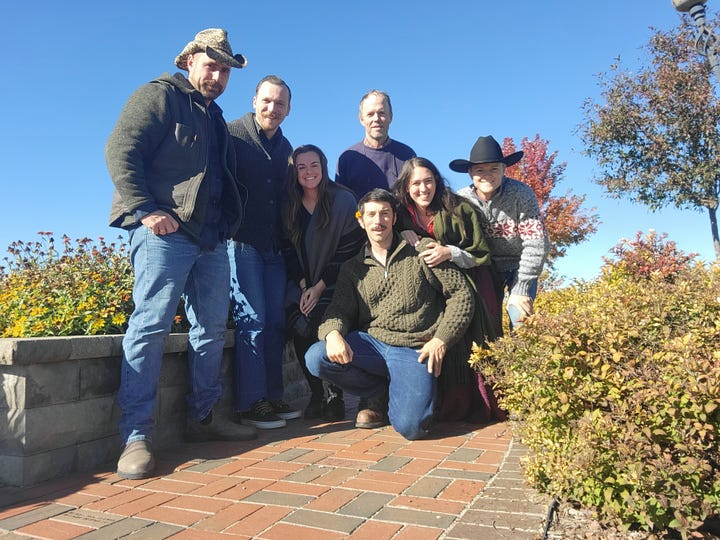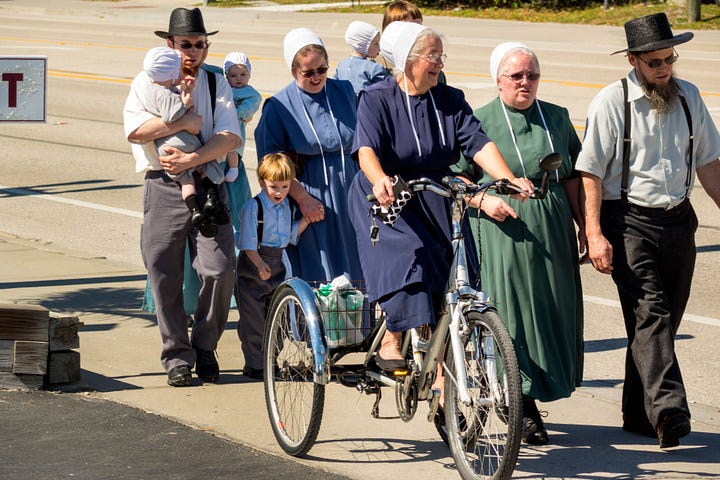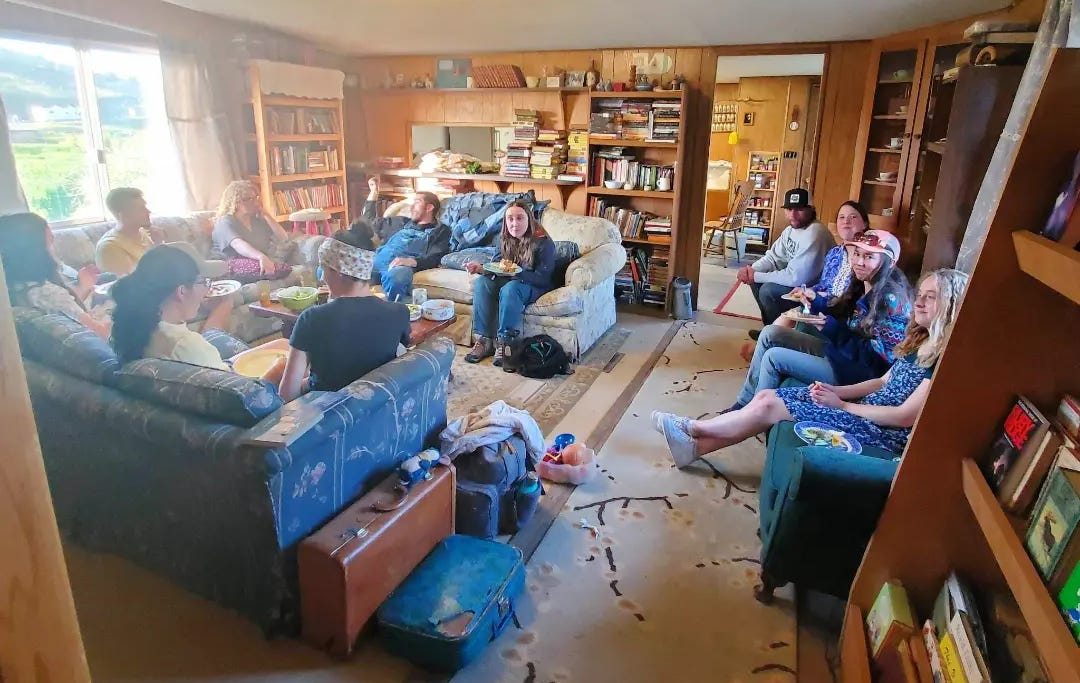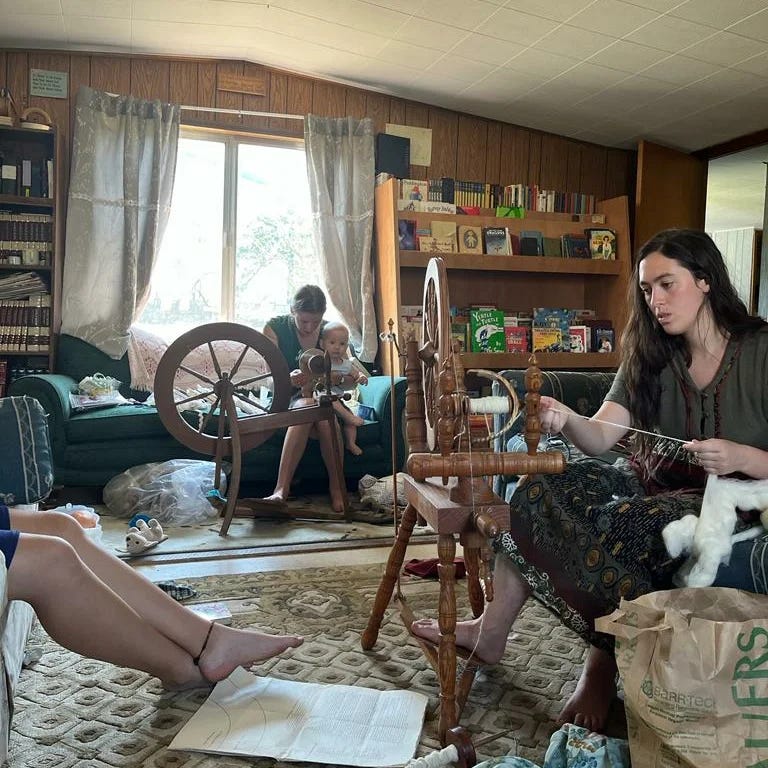A new year is upon us, and with that the regular desire to make resolutions of personal improvement. But what if we took a year off from fretting over our weight, food choices, and hobbies and turned our eyes to the stagnated atmosphere of our homes, the dusty guestroom, and the next-door neighbor’s whose names we still don’t know although it’s been months since they moved in. What if we took a moment to learn from someone else whose been doing it a lot longer than anyone else, and cultivated the necessary assets a thriving community requires. It doesn’t really require much, except for a little self-denial and a whole lot of focused dedication to stick out something purposeful.

I’ve recently read two nonfiction titles that are gloriously refreshing. I plan to keep extra copies around the house to give away, or to provoke further dialogue. I encourage my readers to do the same! Here is a little bit about both:
𝑩𝒆𝒕𝒕𝒆𝒓 𝑶𝒇𝒇 by Eric Brende


Something for young couples to consider their first year of marriage: why not go live with an established community or cult to learn lost skills? It's a great thing to do before you have children, doesn't need to be traumatizing if you do it for a limited time, and can positively impact the rest of your lives together.
Andy and I spent a week in St Louis this mid-October and had the pleasure of meeting Eric Brende after a Latin Mass service. Immediately, we hit it off when we learned he was a pianist and kept a very sustainable household. He told us he was a published author, flippantly, as if it were no big deal, on our way down to the parish hall for donuts.
“Oh?” Andy asked, to be polite. “What have you written?”
Better Off. Andy perked up, “I’ve read that.”
He loaned us the use of two recumbent bicycles a couple days later and gave us a delightful tour of the city, followed up with a glass of his homemade pear cider, fermented and pressed from the pear trees growing on his quarter acre lot. After that, he bought a train ticker and joined us on some of our travels out to Wisconsin, then gave us a copy of his book, which I started reading after the Front Porch Republic in the corner of a loud bar. It grabbed my attention, and I easily faded out of my loud surroundings into a happy, introverted place.


All this to preface how I came to read such a rich beautiful story that accounts the story Eric Brende’s first year of marriage, and of how he and his wife moved to an Amish community for an 18-month experiment. It resonated deeply with me, echoing examples of odd values Andy and I share, and I felt inspired after reading it, despite the author’s marriage eventually failing. Their shared efforts at the beginning were truly a worthy, noble endeavor, and I hope Andy and I might emulate it to some extent, with our shared skills and travels. Eric also shared a bread recipe with me that has become one of Andy’s and my very favorites!
𝑻𝒉𝒆 𝑮𝒐𝒔𝒑𝒆𝒍 𝑪𝒐𝒎𝒆𝒔 𝒘𝒊𝒕𝒉 𝒂 𝑯𝒐𝒖𝒔𝒆 𝑲𝒆𝒚 by Rosarie Butterfield
“Radically ordinary hospitality is this: using your Christian home in a daily way that seeks to make strangers neighbors, and neighbors family of God.” - Rosaria Butterfield
I’ve quoted and recommended this book often enough, and thought it was about time I actually read it. I downloaded the audio book from Hoopla and listened to the bulk of it while sewing on my wedding dress and cutting up pie apples.
I rarely feel this way about any particular book, but this book is essential, especially if you profess Christianity. But even if you simply feel dragged down by the idea of how to have community, how to “save the world” from the vapid pursuit of self, and wish to do something about it, this book offers key steps to not being the problem anymore: to stop coping and start hosting a space for everyone.
The author establishes the importance of hospitality from the get-go. It isn’t a calling that only some receive, but that all Christians are duty bound to fulfill. It isn’t a skill or talent, and it doesn’t require wealth… in fact, fancy things can be a hindrance. Forget the fancy rug and fancy dinner wear if it hinders you from being generous. The author talks further about being and introvert, and how this doesn’t excuse her from the work of the gospel. If she needs time for herself, it is her job to find a way to have time alone without interfering with the spontaneity of the Holy Spirit by waking up earlier than the rest of her household to read, or taking an afternoon walk.
“We introverts miss out on great blessings when we excuse ourselves from practicing hospitality because it exhausts us. But... Knowing your personality and your sensitivities does not excuse you from ministry. It means that you need to prepare for it differently than others might.” - Rosaria Butterfield
She also had a special exhortation to the unmarried in our communities. Do you feel a calling to remain single? Like all “feelings” that lead us to believe we might be called to something as sacred and noble as a purpose from God, we ought to make certain it is backed by truth, and not some indulgent cope to remain in our own little worlds. If you are called to singlehood, it is because you are called to be a servant. And if you aren’t finding ways to serve your community with your ample time but are instead putting most of your energy into pursuing fantastical dreams and hobbies, you are avoiding the call of the gospel for the whims of the flesh. She by no means claimed that it is wrong to develop personal interests and careers, but that these pursuits ought to add to the world rather than validate our own, small existence.
Butterfield painted many lovely pictures of what her home looked like, and how she’d garnered a lot from her era as a lesbian among the LGBTQ+ community, and how they taught her the home is often the only place you might have for a place of safe fellowship and inclusive conversation broaching all topics. She talked about the idea of accepting that which you might not approve of, as Jesus did with sinners, and of being among the lowly as He was and still is, despite the complaints of scribes, pharisees, and other self-righteous prudes. For some it is the closest thing they will know to a hospital or place of gathering and may be the only time people become aware of their role as God’s image-bearer, thoughtfully created and ordained from the foundation of time.
“Hospitality shares what there is; that’s all. It’s not entertainment. It’s not supposed to be.” - Rosaria Butterfield
It may not seem feasible… it may require that you triple your food budget and don’t plan expensive family vacations. It’s not meant to be easy, she said. We aren’t meant to live to satisfy ourselves, but to serve and to love. And when we are loving the things of God the things of the world matter less. Our children may not be involved in sports, but they will be inviting the neighbor children in for a meal, including them in their backyard projects, and create meaningful friendships.
Rosaria Butterfield isn’t asking you to think about whether or not this is for you, she is bold enough to say you must be convicted if you are worried about anything other than hospitality—both as a regular guest and host—and haven’t opened your heart to the radical, ordinary love of God.




Comments
Post a Comment